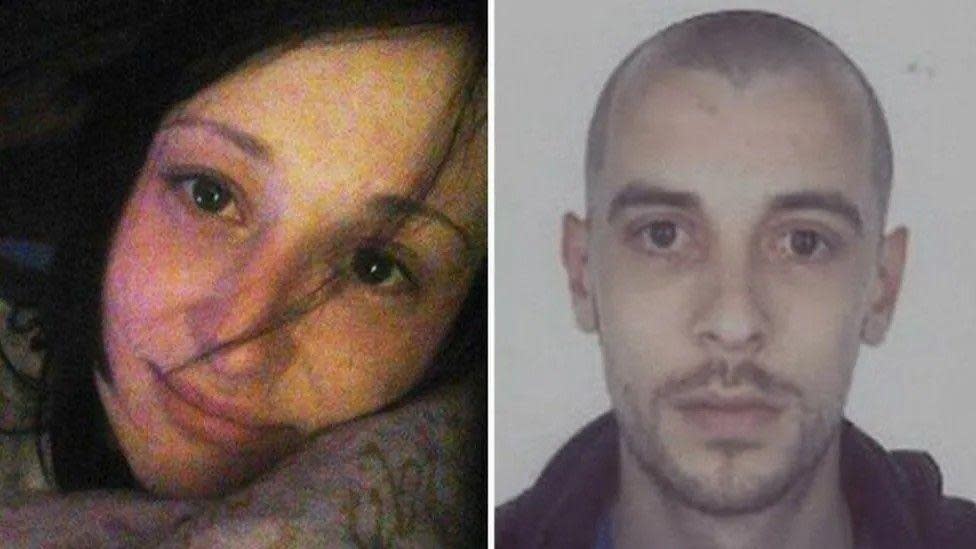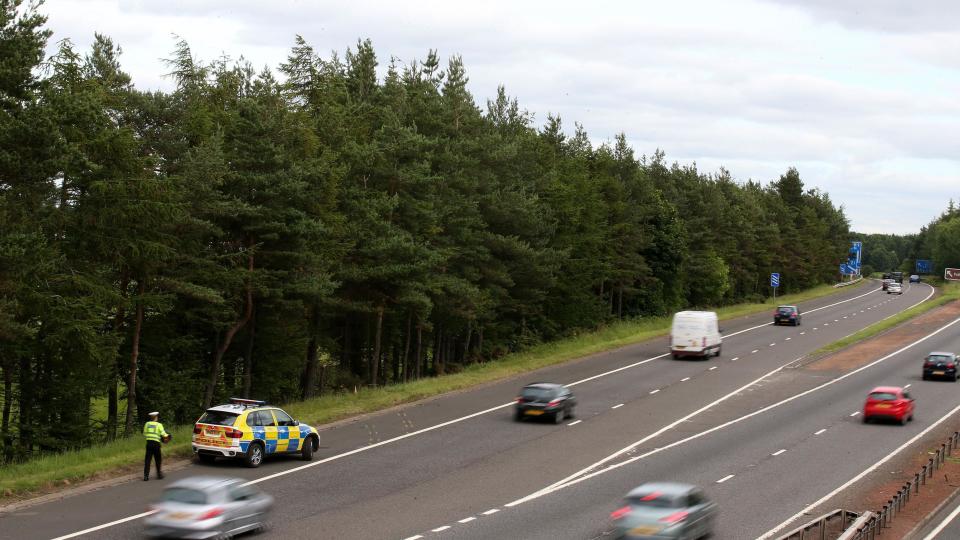M9 crash victim's suffering 'almost incomprehensible'

Police Scotland's failings led to "almost incomprehensible" suffering for a young woman who was trapped in a car with her dead partner for three days, a fatal accident inquiry has said.
Lamara Bell lay terribly injured but conscious at the bottom of an embankment off the M9 motorway near Stirling for days despite a call being made to police hours after the crash.
Ms Bell's partner John Yuill, who was driving the car, died soon after the crash in July 2015.
But the inquiry found Ms Bell would probably have survived if an "organisational failure" in Police Scotland's call-handling system had not allowed a human error to go undetected.
Sheriff James Williamson, who led the inquiry, said Ms Bell's injuries, together with the delay in rescuing and treating her, led to her death four days after she was finally found.
Heartfelt apology
The sheriff's FAI report said Police Scotland failed to properly risk assess the call-handling procedures and did not have a system that checked calls were acted on.
It said that an organisational failure led to the safety of the public being compromised and had "fatal consequences" for 25-year-old Ms Bell.
Sheriff Williamson was damning in his criticism of Police Scotland and said the man who failed to log the call was inadequately trained and left largely unsupervised to operate a system that allowed for human error to go undetected.
He said that the circumstances of the deaths had a corrosive effect on the public’s confidence in Police Scotland.
However, his report made no recommendations for future actions, saying Police Scotland had learned the lessons of the tragedy and changed its procedures over the past nine years.

The sheriff's report said the couple, who were both from Falkirk, had been on a camping trip at Loch Earn and left in the early hours of Sunday 5 July.
Mr Yuill – who only had a provisional licence – was driving and had taken cannabis and had drunk alcohol in the hours before he left.
The car plunged down the embankment some time between 06:00 and 06:15, having crossed the hard shoulder and hit a kerb.
Mr Yuill, 28, died as a result of his injuries but Ms Bell was still alive.
Later that morning – about 11:30 – farmer John Wilson saw the crashed car at the bottom of the embankment and called the police on the non-emergency 101 number.
He assumed the police would take action but the call was never logged on its system.
Over the coming days Mr Wilson saw the car was still there.
On the morning of Wednesday 8 July another farmer saw the car and went down the embankment to investigate.
Mr Yuill was dead but he could hear Ms Bell calling for help.
She was taken to hospital but died four days later.
The FAI report said that if Ms Bell had been admitted to hospital on the day of the accident her head injury could have been managed and the complications such as brain swelling, hypothermia and systemic infection could have been substantially avoided.
It said she would probably have survived but would have suffered a long-term neurological deficit.

In the initial call to report the car down the embankment, Mr Wilson spoke to Brian Henry, a police sergeant who had volunteered to do overtime to help out at the Bilston Glen contact centre, which the sheriff described as a "confused, fractious working environment".
The report said Mr Henry gave evidence to the inquiry and "did not shrink from the fact that he took the call and failed to action it".
It said Mr Henry gave a "genuine and heartfelt apology" to the families and had been tortured over the years since the accident trying to work out what happened and to provide an explanation for them.
"Ultimately he is unable to do that, beyond simple human error," the report said.
Human error
Sheriff Williamson's FAI determination said Mr Henry did not deliberately ignore the call and appreciated that it should be acted on.
He made hand-written notes in his "Pot Book" but it is thought that while checking to see if the incident had already been logged he was interrupted.
Mr Henry became involved in other phone calls for the remainder of his shift and never went back to check the entries in his notebook.
The report said the system, which did not check incoming calls against outgoing actions, meant that there was a risk of human error going undetected.
It said Police Scotland could have ensured all call handlers - even non-core staff like Mr Henry - were trained to use the Aspire system at all times.
Police Scotland accepted it failed to train Brian Henry and other non-core call handlers.
The report said the force's failings gave rise to circumstances in which such an error such as the one made by Mr Henry could occur.
The sheriff said Police Scotland was an entirely different organisation now from it was in 2015.
He said the force and other experts were confident that the type of error that led to the deaths of Mr Yuill and Ms Bell being repeated were remote.
"So remote that only wilfully ignoring a call would give rise to a call going unactioned," it said.
Police Scotland has previously admitted criminal liability and pleaded guilty to a contravention of the Health and Safety at Work Act that their failure to record and action a a call materially contributed to the death of Ms Bell and was fined £100,000.
Deputy Chief Constable Alan Speirs repeated his apology to the families and said the police had done everything they could to stop a terrible incident such as this being repeated.
"Sheriff Williamson's findings highlight the significant improvements which have been made to our call handling systems," he said.
"How we respond to 999 and 101 calls now is incomparable to how we dealt with them in 2015."
He added: "We are studying the determination in detail for any learning which will form part of this continuous improvement."
Lamara Bell's father Andrew issued a statement which said he was relieved that the inquiry had taken place and a decision has been issued.
The statement said: "The tragedy which befell the Bell family and the Yuill family was previously unimaginable.
"Too many years have passed to reach this stage.
"Now it is time for everyone to respect the families and friends of these two young people and allow them to work through their grief in peace."
John Yuill's father Gordon said he accepted that the crash was his son's fault but he would hate to see anyone go through the ordeal suffered by his and Ms Bell's families over the past nine years.
"We tried to grieve for my son and we weren't allowed to," he said.
"That was taken away from us."
Mr Yuill said the problems with sickness levels and shortages of staff at Police Scotland's Bilston Glen call centre were well known before the incident.
"I don't blame the officer. I don't believe he was given the right training to work the system," he said.
"Without the training, an accident was always going to happen. It should have been built into the system that human error could not happen."
Mr Yuill said he was disappointed that the report did not make any recommendations to ensure the same mistakes could not happen again.
Andy Shanks, who leads on death investigations for the Crown Office and Procurator Fiscal Service (COPFS), said: “We recognise that the time taken for our investigation and criminal proceedings to conclude and to initiate the inquiry must have been enormously difficult for the families of Lamara Bell and John Yuill."
He noted that it was a complex case and said the way deaths were investigated had changed in recent years to reduce delays.
Mr Shanks added: “The procurator fiscal service will continue to keep in contact with the families following the conclusion of this complex and lengthy FAI and answer any questions they may have about the determination.”
David Kennedy, general secretary of the Scottish Police Federation, said: "The deaths of John Yuill and Lamara Bell were truly devastating for both families.
"Despite Police Scotland’s best efforts, you can’t run an efficient, effective police service with increased workloads, increased legislation and 1,000 less officers.
"Unless the police service is properly resourced and funded, we can only hope that any further mistakes don’t have the same devastating outcomes”


